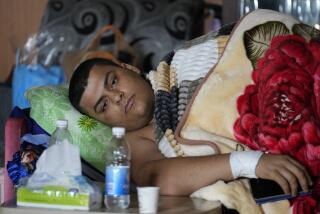Iraq bombing kills 23 at gathering of Sunni, Shiite tribesmen
- Share via
BAGHDAD — The Sunni and Shiite tribesmen had come from across Iraq to turn the page on the fratricidal violence that tore the country apart in the years after the 2003 U.S.-led invasion.
But as they met Friday, an 18-year-old member of the tribe blew himself up, killing 23 people and wounding 35, the Iraqi military said. The attack provided a jarring reminder of the obstacles to reconciliation, even within one clan.
Some members of the Qarqouly tribe had not seen each other for more than six years, and had hoped to revive old ties after weathering the religious extremism and sectarian fighting that divided Iraq and destroyed families and friendships.
“The tribe members were happy to see each other,” said Faris Qarqouly, who lost a brother in the bombing. “We didn’t expect to be attacked.”
Although the number of civilians killed diminished sharply in 2008, Sunni Arab militants are still carrying out lethal bombings. Last month, in the run-up to the U.S. military’s handing over control of the nation’s security to Iraqi government forces Thursday, a total of more than 70 people died in a bombing in Baghdad and another in the northern city of Kirkuk.
On Friday, several hundred Qarqouly tribesmen had gathered in Yousifiya, a Sunni Muslim-dominated rural area south of Baghdad. It was dubbed the “triangle of death” in 2003 because of the car bombings, beheadings and kidnappings that began to occur regularly on a crucial roadway between the capital and the largely Shiite Muslim south.
But things changed beginning in mid-2007, when United States forces seeking to defeat such Islamist insurgent groups as Al Qaeda in Iraq forged alliances with Sunni tribesmen who had supported the insurgency.
Since then, Yousifiya had become quiet enough that the head of the Qarqouly tribe, Sheik Mohammed Abdullah Saleh, invited the confederation to join him there in what would have been a death-wish invitation only a year earlier. Saleh wanted the tribe’s Shiite and Sunni members to find common ground, said tribesmen who attended the meeting. The tribe is predominantly Sunni, but, like many Iraqi clans, counts members of both sects.
Some said the idea had been broached of forming a political bloc at the meeting. The tribal leader did not suspect that one of his own relatives, a teenager named Amin Ahmed Qarqouly who sometimes slept at his house, would blow himself up as dozens were exiting, said Iraqi army Col. Akram Hamidawi. He said Amin, in a show of affection, used to refer to Saleh has his grandfather.
Saleh, the head of Yousifiya’s Sons of Iraq, Sunni paramilitaries fighting Al Qaeda in Iraq, was not among the dead, relatives and Hamidawi said.
Amin, who lived in Saleh’s neighborhood, had been considered unlikely to attack his immediate family. He used to stop by the house so frequently that no one frisked him Friday when he came in through the back entrance, where women had been cooking. His mother and sister were among those attending the party.
Amin’s father left before his son’s attack and was wanted for questioning, Hamidawi said.
Amin had belonged to the Sunni insurgency, and had been jailed in 2007 for his involvement with a group associated with Al Qaeda in Iraq that may have been involved in the capture of three U.S. soldiers who were later found dead, Hamidawi said.
He was released six months ago after a year behind bars.
“Why did he do this? All of these people were his cousins, brothers, uncles,” said Hamidawi, who insisted that Al Qaeda in Iraq had been defeated in his area.
The bombing resembled similar attacks in Anbar province, once a hub of the Sunni insurgency, where clans have split, with some choosing to continue fighting alongside Al Qaeda in Iraq and killing fellow tribesmen who teamed with the U.S. military.
The tragedy showed how vulnerable the country remains to suicide bombings in the run-up to provincial elections at the end of the month.
In Baghdad, people waited in the corridors of a hospital for news of their relatives.
Qais Mohammid Hassoun, who lost two brothers in the bombing, said he had been washing his hands after eating the celebratory meal of lamb and rice when he heard a loud blast and thought a mortar shell had hit.
He rushed out and carried two wounded brothers to an ambulance; then someone shouted that a third sibling had died.
Hassoun, a laborer, had attended the meeting because he wanted to renew his ties with Shiite tribesmen and friends from the southern city of Nasiriya.
In the past, “because of the security situation, a Qarqouly from Nasiriya couldn’t enter Yousifiya,” Hassoun said.
Before the explosion, people delivered speeches about defending Iraq and moving beyond sectarianism. But the happiest moment for Hassoun came when he was reunited with his old primary school teacher, who had moved south after 2002.
“I hate these terms ‘Sunnis’ and ‘Shiites,’ ” Hassoun said, waiting anxiously for news of his wounded relatives. “Our gathering was meant to overcome these issues.”
--
More to Read
Sign up for Essential California
The most important California stories and recommendations in your inbox every morning.
You may occasionally receive promotional content from the Los Angeles Times.













